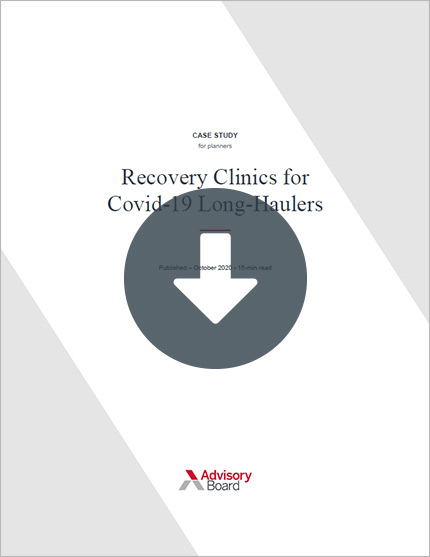Auto logout in seconds.
Continue LogoutLong Covid symptoms may vary depending on which coronavirus variant a person initially contracted, according to preliminary research that will be presented at the European Congress of Clinical Microbiology & Infectious Diseases in April.
Case study: Recovery clinics for Covid-19 long-haulers
Study details and key findings
For the study, researchers analyzed data from 428 patients who had been hospitalized for Covid-19 and were later treated at a post-Covid outpatient service at Careggi University Hospital in Italy between June 2020 and June 2021. Of the patients, 59% were men, and the average age was 64. The average length of hospitalization was 10 days, and median follow-up time after hospital discharge was 53 days.
Of the patients, 76% reported at least one persistent Covid-19 symptom at follow-up. The most commonly reported symptoms included shortness of breath (37%), chronic fatigue (36%), insomnia (16%), visual disorders (13%), and brain fog (13%).
However, the researchers found there were differences in the reported symptoms depending on when patients were initially infected. There was a significantly greater prevalence of shortness of breath, muscle aches and pains, insomnia, brain fog, and anxiety/depression among patients who had been infected when the alpha variant was dominant (January to April 2021) compared with when the original coronavirus was dominant (March to December 2020). On the other hand, loss of smell, difficulty swallowing, and impaired hearing were less common during the alpha wave.
In addition, a multivariate analysis found that certain factors were associated with an increased risk of developing long Covid symptoms, including use of immunosuppressive drugs, being female, and increased oxygen support. Notably, patients with type 2 diabetes had a lower risk of long Covid, although the researchers noted that more studies are needed to understand this unexpected finding.
Comments
According to the study's authors, this is the first time long Covid symptoms have been associated with different coronavirus variants.
"Many of the symptoms reported in this study have been measured, but this is the first time they have been linked to different COVID-19 variants," said Michele Spinicci, one of the study's authors from the University of Florence. "The long duration and broad range of symptoms reminds us that the problem is not going away, and we need to do more to support and protect these patients in the long term."
According to Aaron Glatt, chief of infectious diseases at Mount Sinai South Nassau who was not involved in the study, it is reasonable to expect differences in long Covid symptoms depending on the variant.
"It is eminently clear that the different variants have different capabilities," Glatt said. "Clearly some of them are more contagious, and some of them are able to cause more severe illness. Likewise, some variants have a greater predilection for different age groups. Therefore, it is no surprise that there may be differences in 'long COVID' between the variants as well."
However, the authors acknowledged several limitations to their study, including its observational design, which cannot prove cause and effect, and the fact that they could not confirm which coronavirus variant caused the patients' infections.
In the future, studies should "should focus on the potential impacts of variants of concern and vaccination status of ongoing symptoms," Spinicci said. (McGorry, Fox News, 3/27; Hamza, MedPage Today, 3/25; ECCMID news release, 3/24)
Download the case study

Several health systems have set up dedicated recovery clinics to help treat and coordinate care for long-haulers. This resource provides an overview of Covid-19 recovery clinic models pioneered by two early adopters—The University of Iowa Hospitals and Clinics and the University of Pennsylvania Medicine—and considerations for assessing whether it is a model you should pursue.
Don't miss out on the latest Advisory Board insights
Create your free account to access 1 resource, including the latest research and webinars.
Want access without creating an account?
You have 1 free members-only resource remaining this month.
1 free members-only resources remaining
1 free members-only resources remaining
You've reached your limit of free insights
Become a member to access all of Advisory Board's resources, events, and experts
Never miss out on the latest innovative health care content tailored to you.
Benefits include:
You've reached your limit of free insights
Become a member to access all of Advisory Board's resources, events, and experts
Never miss out on the latest innovative health care content tailored to you.
Benefits include:
This content is available through your Curated Research partnership with Advisory Board. Click on ‘view this resource’ to read the full piece
Email ask@advisory.com to learn more
Click on ‘Become a Member’ to learn about the benefits of a Full-Access partnership with Advisory Board
Never miss out on the latest innovative health care content tailored to you.
Benefits Include:
This is for members only. Learn more.
Click on ‘Become a Member’ to learn about the benefits of a Full-Access partnership with Advisory Board
Never miss out on the latest innovative health care content tailored to you.
